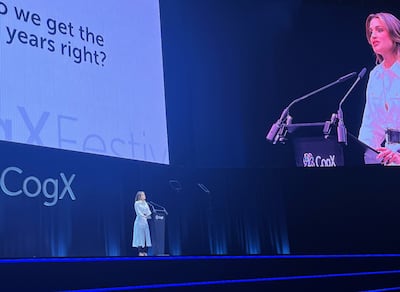Queen Rania of Jordan has admonished developers of AI for creating systems that do nothing to build sympathy for those displaced and suffering around the world.
Speaking at the CogX festival for trailblazers in the advancing technology, the Jordanian queen laid down a set of challenges for entrepreneurs and developers to boost human progress over the next 10 years.
She cited the reaction to the sinking of a boat off Pylos, Greece, in June in which more than 200 died, including all the women and children on board. The Mediterranean tragedy was used as an opportunity for opposing political sides to make “right-sided” arguments past each other.
The veteran campaigner also pointed out how little was made of the differing levels of support for those displaced by war across Europe, compared with the people who fled the fighting in Sudan.
“I cannot help but note the contrasting compassion for refugees who fled Ukraine versus those who fled Sudan. Four months into the war in Sudan less than 30 per cent of donor appeals [have been funded], while the Ukraine emergency appeal was 70 per cent funded.
“I don't think we need a supercomputer to explain such discrimination.”

She explained the need for the technology to bridge the gap in the language around today’s global issues. “When we demonise people for seeking a better life for their families, we normalise their suffering," she said. "We normalise 11 children on average drowning each week in dangerous Mediterranean crossings.
“Perhaps [the] question for this gathering is what good is artificial intelligence if we cannot summon authentic empathy? That's why to get the next 10 years right, we should do the right thing, right now."
Pointing out the pivotal advances in systems such as the large language models introduced to the public just this year, Queen Rania said these considerations were important for development.
“Every decision we make or don’t make today will define our future," she said.
Explaining why a false sense of security was a danger in the technological developments emerging, largely from California-based developers, she urged the sprawling three-day congress in London to consult with those on the margins.
"Even our greatest technological advances seem potentially catastrophic, with some of the people who gave birth to AI now warning that it could end us all," she said.
She recalled people on the margins with nothing who still manage to share everything." If the world's most powerless have such strength, what does that say about the rest of us?" she said. "Inviting doubt is how we test the strength of convictions."
"Our capacity to lead is only as effective as our ability to follow. To get the next 10 years right, we are all going to have to get a lot more comfortable with being wrong."
Best-selling novelist Yuval Noah Harari set the stage for Queen Rania by sharing some of his doubts about the rapid development of technology, which he likened to the sci-fi impact of an alien invasion. Drawing on his historian's perspective, he expressed fears that while humans adapt by making mistakes, machines would not grant time for this learning process.
"AI is basically like an amoeba in terms of organic evolution," he said. "It took amoebas hundreds of millions of years to become dinosaurs. With AI, the current amoeba could transform into T-rex within 10 or 20 years. The digital revolution works at a pace thousands of times faster than organic evolution.
"We don't have time to adapt."
He advised the pioneering companies behind the technology to put aside a share of their revenue for mitigation of its impact and to place controls on the development, such as restricting the machines' right to free speech as a privilege only for mankind.


